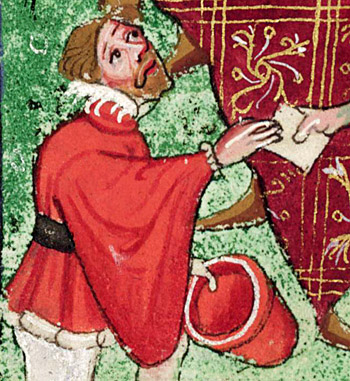Sir Degrevant
General Information
Plot Summary

Sir Degrevant is a noble and accomplished knight of the Round Table. He loves hunting on his well-stocked estate and is generous to the poor, his guests and minstrels. While he is away on crusade, his neighbour, an Earl, breaks into his parkland, stealing his game and killing his foresters. Returning to find his tenants robbed and his estate ruinous, Degrevant fences off his lands and sends his squire to the Earl with a legal letter. When he rudely refuses to desist, Degrevant arms his men and the next time the Earl hunts on his lands, ambushes him. They fight fiercely until the Earl flees, leaving many of his men dead.
The next day, Degrevant rides to the Earl’s castle and challenges him. The Countess tries to reason with him from the walls, and as he looks up he sees her daughter, Melidor. He falls instantly in love and departs, vowing to hunt in the Earl’s forests instead of attacking his castle. That night, he and his squire conceal themselves in Melidor’s orchard. After she has attended chapel in a fabulous jewelled dress, Degrevant approaches her and confesses his love. Melidor threatens to call her father’s guards, but her maid pleads for the chance to sleep with the knight. Her mistress scornfully agrees, and when they are inside the castle, Degrevant reiterates his love for Melidor. The maid informs him that another of her suitors, the Duke of Gerle, has arranged a tournament in her honour. The grateful Degrevant betrothes the maid to his squire, giving them a deed for a hundred pounds of land. She promises to help him and shows him a secret exit from the castle.
Melidor’s maid tells her mistress about her conversation with Degrevant, but she remains determined to reject him. Her father promises her to the Duke of Gerle, who in return vows to slay Degrevant during the tournament. Over the course of the two days, however, Degrevant twice unhorses the Duke, who is mocked by Melidor and departs humiliated. Degrevant uses the secret entrance and visits Melidor in her chamber, which is decorated with biblical stories and romance heroes. She welcomes him, and admits that she returns his love. They plight their troths but she refuses to sleep with him until they are married.
He visits her every night for nine months, until a forester sees him and informs the Earl. His steward sets an ambush, but Degrevant defeats him, killing many members of the household. He spends the night as usual, and conceals the skirmish from Melidor. In the morning, however, the dead bodies are brought into the hall and the Earl confronts Melidor about her lover. He threatens to execute her, but the Countess intervenes, observing that Degrevant acted in self-defence and lost many of his own men to the Earl. On her advice, the Earl agrees to the marriage, and Degrevant is summoned. The two are reconciled, and Degrevant marries Melidor in a lavish ceremony. The Earl and Countess die the same year, leaving their lands to the couple; they live together for thirty years, and have 7 children. When Melidor dies, Degrevant rejoins the crusades and is slain in the Holy Land.
From: Erik Kooper, Ed. Sentimental and Humorous Romances. Kalamazoo, Michigan: Medieval Institute Publications, 2006.
Manuscript: Cambridge, Cambridge University Library MS Ff.1.6
Manuscripts
Click a title below to search for all romances in that manuscript.